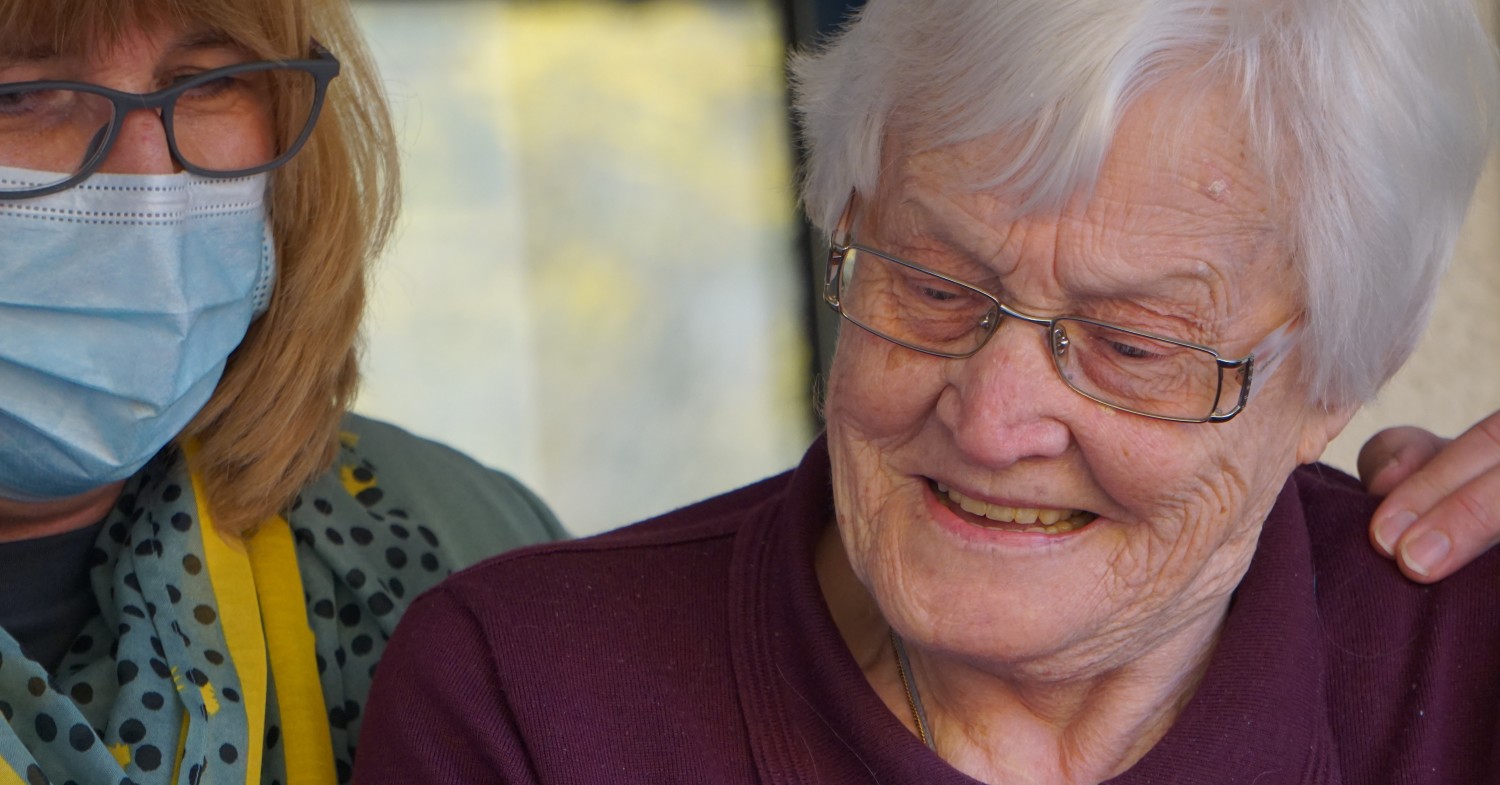
How Much Does a Medical Social Worker Make?
The average salary for a medical social worker is $62,000, [...]

What does it take to become an effective palliative care social worker? Success in this challenging, fulfilling profession requires the right combination of education, practical experience, and hard and soft skills. This article enumerates and describes the top 10 palliative care social worker skills. It also discusses:
Palliative care social workers address clients’ physical, mental, social, and spiritual well-being through various stages of illness. They conduct patient assessments and coordinate relevant care. They also collaborate with multidisciplinary healthcare providers to ensure positive care outcomes.
Palliative care social work can be challenging, as it centers around helping people through very difficult and trying times in their lives. However, the rewards can outweigh the challenges. Palliative workers are in a position to learn about and celebrate patients’ life stories. They also enjoy the satisfaction of working with an interdisciplinary team of caregivers to promote pain management and accommodations that make their clients’ daily life more manageable. Last and most importantly, their work results in a significant quality-of-life improvement for clients experiencing serious illness and debilitating conditions.
| University and Program Name | Learn More |
|
Virginia Commonwealth University:
Online Master of Social Work
|
Palliative social work requires a robust mix of hard and soft skills. Some of the most essential are listed below.
Workplace communication can make the difference between a healthy work environment and a hostile one. You may have noticed that your colleagues either talk more than they listen or listen without really paying attention. Or you could be lucky enough to be surrounded by those who’ve mastered their active listening skills. The same applies to the social work field, especially in a healthcare setting.
Well-trained palliative care social workers know when to sit back and absorb information versus when to apply it to improve patient outcomes. Because a large part of the palliative care social worker’s job involves communicating with patients and their family members to ascertain their goals and desires, active listening is a critical skill.
Active listeners focus attentively on a speaker, observing both verbal and nonverbal cues. They reflect upon what’s being said and may even retain the information for later. It’s important for palliative care social workers to:
Active listening can result in more successful care planning and improved quality of life for patients.
Palliative care social workers collaborate with a larger palliative care team to provide care coordination, care management, and case management for multiple patients dealing with life-limiting and terminal illnesses.
They participate in regular team meetings with medical and human service professionals to assess patient needs and identify gaps in care. Palliative care social workers serve as important points of contact among various clinicians, patients, family members, and the greater treatment team.
Palliative care social workers also play a critical role in the patient intake, transfer, and discharge processes. They administer psychosocial assessments, acclimate patients and their families to the care environment, and update the treatment team regarding patient needs.
When patients experience mental, emotional, social, and familial crises, palliative care social workers may provide emergency support. They may offer immediate counseling and psychological support, while also coordinating care services with the rest of the treatment team.
Palliative care social workers regularly advocate for patients and their families. In order to advocate effectively, they must be able to make sensible and, sometimes, time-sensitive decisions regarding a patient’s care and individual goals. Honing your decision-making skills is critical to maintaining success in this field.
Empathy is an indispensable characteristic for anyone providing counseling and psychotherapy to patients. Empathy is the ability to understand and share the feelings of another person. The act of empathy reflects one of the National Association of Social Workers’ (NASW) core values–dignity and worth of the person. Empathy guides professionals to respect everyone’s unique situation, strengths, and vulnerabilities.
Empathetic care is critical to a patient’s well-being. Studies have shown that patients with an empathetic therapist tend to progress more in treatment and experience a higher probability of eventual improvement.
Due to the unpredictable nature of palliative care, it’s important to embrace a flexible mindset going into the profession. You’ll interact with patients at various junctures in their illnesses. They’ll require unique care plans and different forms of advocacy. Some will require end-of-life care.
As a palliative care social worker, you’ll also collaborate on multidisciplinary teams to coordinate care for your patients. This requires the ability to quickly pivot among different patients and care providers.
Palliative care social workers benefit from committing to lifelong learning. They should seek out professional development opportunities in accordance with NASW standards and their state requirements.
Monitoring patient progress is an integral component of a palliative care social worker’s job. This means scheduling regular meetings and visits with patients, their family members, and other treatment team members to ensure that patients progress toward their treatment goals.
If you know a palliative care social worker, you probably know that they often juggle competing priorities. On any given day, they may work through a number of tasks, including processing intakes and discharges, meeting with patients to administer psychosocial assessments, communicating with patient family members to ascertain concerns and needs, coordinating with other members of the care team to implement relevant services, and more.
The ability to manage your time effectively bodes well for any career in social work. Knowing which tasks to prioritize is key to your long-term success.
Palliative care social workers conduct psychosocial assessments of clients to determine their psychological, social, emotional, and spiritual needs. They document their findings in written reports, client records, and care plans. The types of questions included in psychosocial assessments include those regarding:
The content contained within these assessments communicates relevant information regarding case planning and referral needs. They establish a written account of current patient status during service provision and offer baseline information about clients upon their intake and discharge.
They offer palliative care social workers an opportunity to reflect, refine ideas, and raise questions about clients and their situations.
Because multiple stakeholders have access to palliative care social workers’ reports, which are used to make important care decisions, it’s critical for the information to be well-organized, coherent, and accurate.
Social work practice requires a Bachelor of Social Work (BSW) degree at minimum. However, many hospice and palliative care social workers have a Master of Social Work (MSW), a Master of Science in Social Work (MSSW), or a Ph.D. degree. Licensure, certification, and registration requirements vary by state.
Most social work degree programs include courses in social welfare policy, human behavior, and ethics. Field experience also comprises an important part of the palliative care social work learning experience. Most programs require a practicum, which you can complete in a hospice or palliative care setting. In addition to the practicum, you can also seek out a paid internship or fellowship to supplement your classroom experiences.
If you’re looking for a flexible, online master’s degree program in social work, consider:
Some palliative care social workers also choose to pursue advanced certification in palliative care social work, which requires experience, licensure, commitment to ethical practice, and passage of an evidence-based exam. Certifications provide third-party validation of your knowledge to prospective employers.
The NASW offers the Certified Hospice and Palliative Social Worker designation to those with bachelor’s degrees and an Advanced Certified Hospice and Palliative Social Worker certification for master’s-level social workers. The Social Work Hospice and Palliative Care Network offers an Advanced Palliative Hospice Social Worker certification for those with both bachelor’s and master’s degrees.
Palliative care social work offers plenty of opportunities to grow both personally and professionally. Excellent communicators fare well in this field, which requires the ability to interact effectively and listen to patients in order to advocate on their behalf. The stressful nature of the field also demands empathy, patience, and the ability to anticipate patient needs. When you master the ten abovementioned skills, you’ll be in good shape to pursue a career in this challenging yet fulfilling field.
(Last Updated on February 26, 2024)
Questions or feedback? Email editor@noodle.com

The average salary for a medical social worker is $62,000, [...]

Medical social workers help clients at a variety of service [...]

Palliative care focuses on pain management and relief and other [...]

A hospice administrator oversees a patient's care team and healthcare [...]

Caseworkers do one job but work in many fields, from [...]
Categorized as: Medicine, Social Work, Social Work & Counseling & Psychology